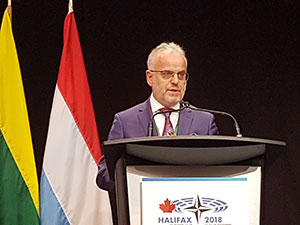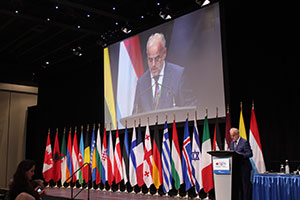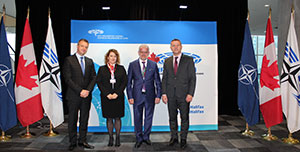 Monday, November 19, 2018, Halifax, Canada
Monday, November 19, 2018, Halifax, Canada
Address of the President Xhaferi at the 64th Annual Session of the NATO Parliamentary Assembly
Distinguished President of the NATO Parliamentary Assembly, Mrs. Rasa Jukneviciene,
Distinguished colleagues, members of the NATO Parliamentary Assembly,
Your Excellencies,
Ladies and gentlemen,
At the beginning of my address, I would like to express my appreciation to the President of the NATO Parliamentary Assembly, Mrs. Rasa Jukneviciene, for supporting the Republic of Macedonia on its path towards the NATO Alliance, and to NATO for their engagement through delivering the invitation for membership of the Republic of Macedonia in NATO a few months ago. Particularly pleasing was the fact that in her work program, among other things, the policy of partnership and open doors was listed as a priority, namely, the membership of the Western Balkans states, Ukraine and Georgia in NATO. With your permission, I will make a small retrospective on our presence in the NATO Alliance.
The Republic of Macedonia has been present in the NATO Parliamentary Assembly as an associate member since 1994. Personally, as a Member of Parliament I led the Delegation of the Assembly of the Republic of Macedonia in 2010. Allow me to remind you that during this period we hosted seven sessions of the Rose-Roth Seminar. The last one, the 98th session, was held in Skopje, in July this year. All of this speaks not only of our formal presence in the NATO civilian structures, but together with the participation of our troops in the peacekeeping missions led by NATO in Iraq and Afghanistan, demonstrates our active contribution, of course, within our capabilities, to the preservation of peace that is an indivisible category. Throughout this time, regardless of how small or great our contribution is, there is something that has been stated and repeated aloud by all who have cooperated with the members of our security forces who are part of NATO peacekeeping operations, and that is that they are genuine professionals with highly assigned values, skills and standards, equal to all members of NATO structures. It is a confirmation that we are learning, growing and developing as security forces, and at the same time, as a society, and as a state. In this regard, although my education profile is a soldier and I have been professionally an active officer, and later Minister of Defense, no matter how dear to my heart that dimension is to me, I will still skip the military dimension and emphasize the second, civilian component of the NATO organization. Namely, the Republic of Macedonia since 1991, when it became an independent, sovereign state chose its path of direction and development, that is, meeting the requirements for full-fledged membership in the Euro-Atlantic family. That commitment was a guiding star which played a very positive role in the overall transition processes of the states in Southeast Europe, among which belongs the Republic of Macedonia as well. Respectively, through it we learn and accept the principles and standards of parliamentary democracy, the respect for individuals and collective human rights and freedoms, the rule of law and legal state. Meeting these requirements will contribute to our citizens feel equitable and equally valuable to society, and they will respond with trust in state institutions and loyalty to the country. The economic security goes hand by hand with legal security, that is, the country becomes attractive for foreign investors as well, for whom the full - fledged NATO membership is a sufficient proof that their investments are secure and safe, and certainly, there is a benefit for the domestic economy which becomes more powerful, new jobs are created and of course, the unemployment in the country is reduced, consequently, our youth is motivated to plan their educational upgrade, their professional growth and development and the future of their family here, at home, in their country. And most importantly, the safety of life, property, inviolability and integrity of the borders are essential. For these reasons, according to public opinion surveys, in the Republic of Macedonia, the support of citizens for our full-fledged Euro-Atlantic integrations is constant and above 75 percent.
 Ladies and gentlemen,
Ladies and gentlemen,
I will not talk about why we are not a full fledged NATO member yet. I will not talk about the Bucharest Summit, when the Republic of Macedonia was blocked and did not become a full-fledged NATO member, although then, together with Albania and Croatia we met the admission criteria. I want to talk about the present and briefly present the current situation in the Republic of Macedonia, which is directly related to the realization of our strategic goals, namely NATO and EU membership.
It is generally known that good-neighborly relations, resolving open issues and consequently, the consensual decision-making represent a conditio sine qua non for uninterrupted admission in the NATO Alliance. Starting from the need to remove these real obstacles, the current parliamentary majority and the Government of the Republic of Macedonia, with the support of the citizens, jointly took a stand and foremost took bold and visionary steps in the direction of overcoming these obstacles which have blocked our NATO and EU integration. Primarily, the Agreement on friendship, good neighborliness and cooperation with the Republic of Bulgaria was signed, which affirmed the existing strong ties and opened the door for even a closer cooperation in various areas, beginning from infrastructure to culture, and then, in early summer, after a long 27 year dispute, the Ministers of Foreign Affairs of the Republic of Macedonia and the Republic of Greece signed the Final agreement to resolve the name issue and for strategic partnership between two countries, or the so-called Prespa Agreement. This Agreement created a framework for the definitive resolution of this dispute that has plagued the bilateral relations between Athens and Skopje, namely, it prevented the establishment of normal diplomatic relations and the development of natural, good-neighborly relations and cooperation with the immediate neighbor. The signing of these agreements, metaphorically speaking, brought both the state and our society back to the Euro-Atlantic track. Undoubtedly it was not easy, there were doubts and disbelief, reaching a compromise is never easy, there will always be someone unsatisfied, however, we must not look at it being a winning or a losing party. We are all winners, because we opened the way of reason to reach an acceptable solution for both sides. Although, I must say that it will not be easy, however, we have proved that when there is will, when there is a vision for the future, everything is possible, even mountains can be moved, because frankly speaking, the condition of status quo at times was frustrating and it was most felt by our citizens. In addition, this had implications for the situations in the region of Western Balkans and beyond. The validation of the Agreement is foreseen after the completion of several phases and procedures. Initially, the Agreement was ratified in the Assembly of the Republic of Macedonia, followed by a referendum voting of citizens on the issue of accepting the Prespa Agreement that would open the way towards the country membership in EU and NATO structures. As you know, due to the boycott by the opposition, the referendum did not meet the required census of turnout, but it is a fact that the majority of over 630 000 citizens who came out to vote, supported the Agreement with the neighboring Greece with their vote, that is, they supported the constitutional changes, imposed with the implementation of this Agreement.
While I am here, I would like to inform you that in the Assembly of the Republic of Macedonia the procedure for amending the Constitution of the Republic has already begun, and currently the Committee on Constitutional Issues has finalized the debate on the amendments submitted by the Government and they are forwarded to a further procedure prescribed by the Rules of Procedure of the Assembly of the Republic of Macedonia. The next phase is a comprehensive public discussion on the draft amendments with the participation of various social entities of the academic and expert public, the non-governmental sector, the business community etc. In this way, we want these essential amendments to be primarily understood and supported by a wide range of citizens, as well as from various social and political entities. However, I would not like to burden you with the procedures, I just want to introduce you with a very significant fact, which is that, in order to begin the procedure of constitutional amendments itself, in addition to the parliamentary majority, a part of the opposition voted as well, because currently the majority of the opposition does not support the Agreement with the neighboring Greece yet. The situation also does not differ in Athens, however, day by day the change in the perception of this new moment in the development of our young state is felt, and I believe that the progressive, visionary and the true patriots will make the right step for a future certain progress of the Republic of Macedonia, and finally, when the amendments should be adopted in the Assembly and become an integral part of the Constitution, although we might not have a complete consensus, but a large part of the opposition will vote for constitutional amendments. Then, it is up to the Republic of Greece, namely, the ratification of the Agreement in the Greek Parliament, the notification to the President of the Council of the EU that it supports the beginning of the negotiations for Macedonia's membership and the notification to the NATO Secretary General that it supports to extend an invitation for Macedonia's accession in this structure. This will mean fulfilling the strategic commitments of the Republic of Macedonia, adopted since its independence in 1991, this will mean fulfilling the goal for which all past and current holders of power in the country have worked and contributed.
 Distinguished colleagues,
Distinguished colleagues,
The American president Harry Truman who is one of the founders of the NATO Alliance in the distant 1949 has said, I quote:
"Progress occurs when courageous, skillful leaders seize the opportunity to change things for the better" and added:
"Men make history and not the other way around"
I think that at the moment, there are such leaders not only in Skopje and Athens, but also in other countries. The opportunities are here in front of us, and those are the Euro-Atlantic integrations, that is, the membership in NATO and the European Union. Let us not forget that the integration processes contribute that the definition "The Balkans as a powder keg",, slowly, but surely to go down in history, and I believe that all of us who live in the Balkans have learned the historical lesson and in the future we will be an oasis of peace, regional cooperation and good-neighborly relations.
It would be immodest, if on this occasion, in front of this respected forum, I do not mention the great aid that my country and the region receive from the NATO Alliance as an organization, but also individually from the member states through various projects. Of course, I do not refer only to the material aid which is very significant, but also to the aid for an easier, more efficient implementation of the required reforms in all segments of the society and the state. This aid cannot be expressed in money, and the benefits are felt by us, and will be felt by many generations to come.
Therefore, allow me on this occasion to express my gratitude to the NATO Alliance, and to each individual member state of this Alliance. At the same time, I want to reassure you once again that we will complete our obligations for full-fledged membership in the foreseen term and I hope that by this time next year, we will be the thirtieth full-fledged member of this family.
Thank you!